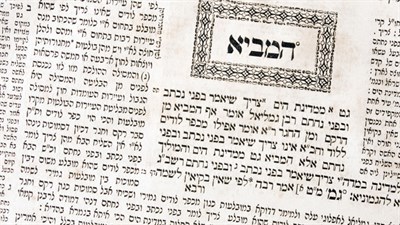
- Beit Midrash
- Mishna and Talmud
- Mishna
Sotah
Lessons
fast navigation

P'ninat Mishpat: Agricultural Water Rights – part I
based on ruling 84122 of the Eretz Hemdah-Gazit Rabbinical Courts
based on ruling 84122 of the Eretz Hemdah-Gazit Rabbinical Courts
Beit Din Eretz Hemda - Gazit | Shevat 5786

Moreshet Shaul: Returning Torah to its Central Standing – part I
Based on Siach Shaul, Pirkei Machshava V’Hadracha p. 312
Based on Siach Shaul, Pirkei Machshava V’Hadracha p. 312
Various Rabbis | Shevat 5786

Ask the Rabbi: Witness Complication at a Wedding
Rabbi Daniel Mann | Shevat 5786

Parashat Hashavua: Rachel, Leah, and King David – What Happened? – part IV
Rabbi Yossef Carmel | Shevat 5786

"Beyond Either-Or"
Rav Kook's Uniting the Opposites, Sinai & the Tefilin's Shi"n
Many have summarized Rav Kook's ideology as "Uniting the Opposites", and this classic class elaborates on the idea via the Shi"n on the Head-Tefilin and the concept of "Laws given orally to Moshe at Sinai". A very basic class in Rav Kook's thought.
Rabbi Ari Shvat | Shevat 5786

WHAT CONVINCED YITRO MAY SWAY THE ANTI-ISRAEL TOO
We find that Yitro was convinced to follow the G-d of Israel for "Now I know that the Lord is greater than all the deities, for (precisely) with the thing that they plotted, [G-d brought] upon them(selves) (18, 11)." Rashi explains that the Egyptians drowned the boys of Israel, so in the end, G-d drowned their men as well. Why was this "Midah k'negged mida" (literally: "a measure for a measure)- so convincing for Yitro, even convincing him to actually change his life & join Israel? Similarly, this can help us understand why this theme of "V'Nahafoch hu…" (literally: "it was reversed", that the Megila flips everything Haman planned to do Israel, 180 degrees and brings upon Haman himself is so central also to Megilat Esther & the forthcoming holiday of Purim? We are not just speaking of irony, but of justice.
Rabbi Ari Shvat | Shevt 5786

The Moral Benefits of Agriculture- Tu B'Shvat
The tanna R. Elazar writes that in the ideal world, all of us will participate in some form of agriculture, and that "a man without land is not a man". Aside from the mitzva of settling the Land of Israel, an overview of many quotes from R. Elazar will innovatively (but obviously) explain the many moral benefits (even in America!) of doing some gardening and having a deeper understanding of Tu B'Shvat.
Rabbi Ari Shvat | shevat 5786

Orchot Tzaddikim- class 78, Teshuva part ix
The class deals with especially interesting aspects of Teshuva (we're skipping and just doing the most interesting parts of the remainder of this chapter), including how G-d really helps us in this effort, and as opposed to man, He will accept us even if we have ulterior motives!
Rabbi Ari Shvat | Shevat 5786
Honor Your Parents – and Yourselves!
Rabbi Moshe Leib Halberstadt | 19 Shvat 5786

Ten Commandment Comparison
Many have attempted to solve the question, what is THE difference which can find the common denominator between all 31 differences between the 2 versions of the Ten Commandment? This innovative article suggests that our sages already answered this with one sentence in a well-known Midrash, just most never noticed that seemingly innocent sentence. It deals with the basic difference between the masculine side of the Torah and the feminine.
Rabbi Ari Shvat | Shevat 5786

P'ninat Mishpat: A Contractor’s Leaving the Job in the Middle – part III
based on ruling 84013 of the Eretz Hemdah-Gazit Rabbinical Courts
based on ruling 84013 of the Eretz Hemdah-Gazit Rabbinical Courts
Beit Din Eretz Hemda - Gazit | Shevat 5786

Moreshet Shaul: Eretz Yisrael in Halacha and in Sanctity – part II
Based on Siach Shaul, Pirkei Machshava V’Hadracha p. 137
Based on Siach Shaul, Pirkei Machshava V’Hadracha p. 137
Various Rabbis | Shevat 5786

“Honor Requires an Audience”+ Tu B'Shvat
Rav Kook makes some very interesting "diyukim" (deductions) from this passage in the Talmud about when to wash or moisterize (with oil) right before left, and regarding anointing one's entire body, and relates to small "timely" fixings, as opposed to general improvement.
Rabbi Ari Shvat | Shevat 5786

Ask the Rabbi: Possibly Early Mincha
Rabbi Daniel Mann | Shevat 5786
Daf Yomi Menachot Daf 21
R' Eli Stefansky | 14 Shevat 5786

"FREEDOM CAME WITH A FLAG”- The First Flag of Israel
The Ramban explains that the exodus from Egypt was led by the first flag of Israel. This short article brings many unknown historic and halachic proofs of the importance of the Israeli flag.
Rabbi Ari Shvat | Shevat 5786
Daf Yomi Menachot Daf 20
R' Eli Stefansky | 13 Shevat 5786
Daf Yomi Menachot Daf 19
R' Eli Stefansky | 12 Shevat 5786
Tu B'Shvat and the Complaints Against the Manna
Rabbi Netanel Yossifun | 12 Shvat 5786
Daf Yomi Menachot Daf 18
R' Eli Stefansky | 11 Shevat 5786
Join now to watch your latest lessons and questions and continue watching series' of lessons right from the time you left them.
Login >





